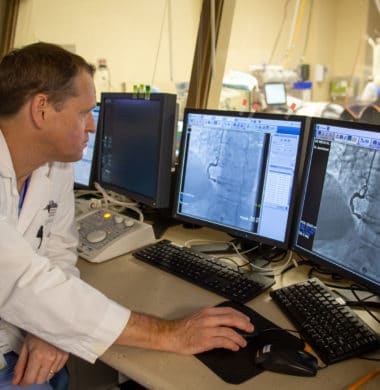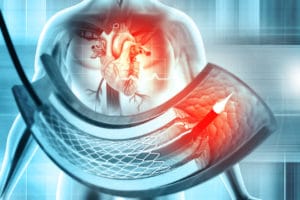When Should I See an Interventional Cardiologist?

At South Denver Cardiology Associates, we take a multidisciplinary approach to your heart care. This means that you will likely get assistance from many different specialists to help you achieve and maintain a healthy heart.
One of the specialists you will likely see is an interventional cardiologist. However, we understand that many people don’t know when or why they should see this type of heart doctor, so we’re providing this helpful guide.
What Is an Interventional Cardiologist?
An interventional cardiologist uses catheter-based treatment to manage heart diseases. A catheter is a slender tube that can pass through your blood vessels to provide treatment to your blood vessels or your heart itself. This is a less invasive approach to cardiac care than open-heart surgery, which makes it a better option for many patients.
Interventional cardiology continues to progress so that many procedures that used to require open-heart surgery can now be achieved using catheter-based procedures.
What Procedures Does an Interventional Cardiologist Perform?
Interventional cardiology can offer treatment for a wide range of conditions. At South Denver Cardiology, some of the most common treatments our interventional cardiologists perform include:
Angioplasty
- Stent placement
- Atherectomy
- Patent Foramen Ovale (PFO) closure
- Left Atrial Appendage Occlusion
- Transcatheter Aortic Valve Replacement (TAVR)
- MitraClip
Before performing any of these procedures, your interventional cardiologist will place a catheter sheath either at your groin or your wrist to allow easy insertion of the cardiac catheter and tools. Depending on the procedure, you might have it performed immediately after the sheath procedure, or it might be scheduled for another time. One cardiac catheter sheath can be used for multiple interventional cardiology procedures, though sometimes different procedures benefit from different sheath placements. In that situation, you might have more than one sheath placed.
Angioplasty
Angioplasty is a procedure to clear plaque from your arteries. Plaque builds up in your arteries because of cholesterol and other fats in your blood. Plaque reduces the heart’s ability to supply blood. It can also break off and block arteries supplying your heart (causing a heart attack), your lungs (causing a pulmonary embolism), or your brain (causing a stroke). By compressing plaque in your arteries, angioplasty improves blood supply and reduces the risk that plaque will break off.
Stent Placement
Stents are hollow tubes that help hold your arteries open. This helps improve the supply of blood to vital organs, including the heart itself.
Atherectomy
In this procedure, a catheterized tool scrapes plaque off the walls of your artery. Sometimes the tool catches the plaque debris, other times it grinds it up fine enough that it can pass safely through your bloodstream.
Patent Foramen Ovale (PFO) Closure
PFO is a hole in your heart that connects the two upper chambers of your heart (the atria). Using a catheter, we can put a patch over the hole, and the heart wall will heal over it.
Left Atrial Appendage Occlusion
Some people have a small appendage on their left atrium. Blood in this small offshoot of the atrium doesn’t circulate as well as it should, which allows blood clots to form there. Sometimes these blood clots can then enter the bloodstream, causing a stroke. Using the WATCHMAN device, we can close this appendage off to reduce your risk of stroke.
Transcatheter Aortic Valve Replacement (TAVR)
TAVR is a treatment for aortic stenosis, when one of your heart valves doesn’t open fully. Using a catheter, we can place a new valve inside the old one. The new valve can open more fully, improving the circulation of blood.
MitraClip
MitraClip is a treatment for mitral regurgitation, when one of your heart valves doesn’t close fully. Without a fully closed valve, blood can flow backwards, which can ultimately lead to heart failure. The MitraClip attaches to your heart valve, helping it close properly.
Get Comprehensive Cardiac Care with South Denver Cardiology Associates
At South Denver Cardiology Associates, we offer a full range of cardiology services, including interventional cardiology, preventive cardiology, and more. We develop a custom heart care approach for you, based on detailed diagnostic services.
Whether you need interventional cardiology or just want to check on the health of your heart, please call 303-744-1065 or use our online form to request an appointment at our main office in Littleton or one of our additional locations across the Front Range.
- Does Vaping Increase Your Risk of Heart Disease? - July 7, 2025
- Lifestyle Factors That Increase Your Risk of Heart Disease - May 26, 2025
- 6 Tips for Exercising Outdoors with a Heart Condition - May 19, 2025
Sign Up
As with any health concerns, your specific treatment program should be discussed thoroughly with your primary care physician as well as any specialists who may need to be consulted – like a cardiologist.
Sign Up

 Angioplasty
Angioplasty